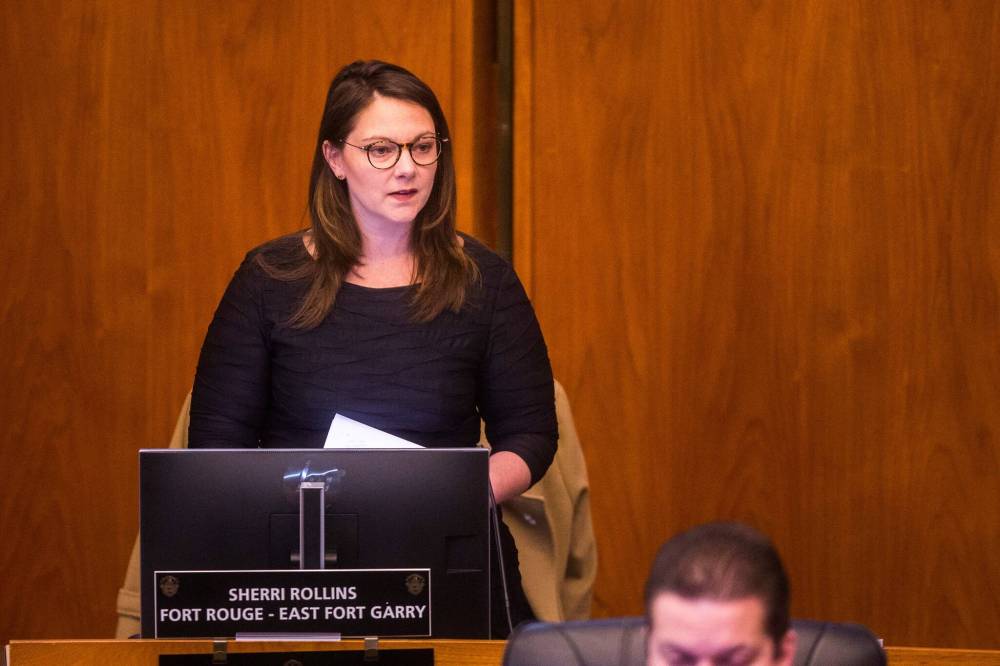City councillor touts drug decriminalization as key to harm reduction
Advertisement
Read this article for free:
or
Already have an account? Log in here »
To continue reading, please subscribe:
Monthly Digital Subscription
$0 for the first 4 weeks*
- Enjoy unlimited reading on winnipegfreepress.com
- Read the E-Edition, our digital replica newspaper
- Access News Break, our award-winning app
- Play interactive puzzles
*No charge for 4 weeks then price increases to the regular rate of $19.00 plus GST every four weeks. Offer available to new and qualified returning subscribers only. Cancel any time.
Monthly Digital Subscription
$4.75/week*
- Enjoy unlimited reading on winnipegfreepress.com
- Read the E-Edition, our digital replica newspaper
- Access News Break, our award-winning app
- Play interactive puzzles
*Billed as $19 plus GST every four weeks. Cancel any time.
To continue reading, please subscribe:
Add Free Press access to your Brandon Sun subscription for only an additional
$1 for the first 4 weeks*
*Your next subscription payment will increase by $1.00 and you will be charged $16.99 plus GST for four weeks. After four weeks, your payment will increase to $23.99 plus GST every four weeks.
Read unlimited articles for free today:
or
Already have an account? Log in here »
Hey there, time traveller!
This article was published 28/01/2022 (1421 days ago), so information in it may no longer be current.
A Winnipeg city councillor is calling for the city to join the movement to appeal to the federal government to decriminalize the possession of a small amount of drugs.
Coun. Sherri Rollins said when police charge a person with possessing drugs, it makes it hard for them to access harm-reduction services, can leave them without a job and there is potential to become homeless.
“It is really hard to seek treatment when you are literally in jail,” said Rollins shortly after her motion came up at Thursday’s city council meeting. The motion was referred to the executive policy committee and it is expected to be voted on by council next month.

“I think it is a really important piece to the harm reduction regime of the city that we don’t have right now.”
Rollins said current laws result in Black and Indigenous people being “dramatically over-represented” in terms of drug possession charges.
She said Winnipeg should join other cities, including Vancouver and Toronto, which have called for the federal government to strike the law.
Coun. Markus Chambers, chairman of the Winnipeg Police Board and the councillor who seconded the motion, said the issue “is more of a health crisis than a criminal issue.”
But, when asked if he supports the motion, Mayor Brian Bowman wouldn’t say.
“I’m going to have to have a lot more discussion with my council colleagues and with community members on this one — I will let you know,” said Bowman. “I would encourage Winnipeggers, if they have views on this, regardless of what their views are, to share them with their members of council.”
Shohan Illsley, executive director of the Manitoba Harm Reduction Network, said of the motion “it is about time.
“We have tons of evidence which shows criminalization of people who use substances has done more harm than good.”
Illsley said once someone is criminalized it makes it hard for public health to help.
She said Portugal decriminalized the possession of small amounts of drugs in 2000 and now 70 per cent of people with drug use problems access health care services versus what she believes are only about 10 to 15 per cent of people here.
And Illsley said there is an even more tragic toll. She says it appears the number of overdose deaths in Manitoba in 2021 will exceed 400.
“For everybody who dies, we have many more people overdosing and needing health care services,” she said.
Jamil Mahmood, the Main Street Project’s executive director, said they support moving away from a criminal justice or abstinence approach towards drugs.
“Our history has repeatedly demonstrated that notions of a drug-free society are abstract at best,” said Mahmood.
“This is just a small step however. We need to be far more proactive and work more on overdose prevention and improving health outcomes through the provision of a safer consumption site, implement drug testing and support legal community access to safer drug supply.”
Winnipeg police Chief Danny Smyth was asked for comment. Instead, the Winnipeg Police Service replied with a report released by the Canadian Association of Chiefs of Police in 2020 which supported recognizing “substance use disorder as a public health issue.”
The association’s report also agreed the evidence suggested “decriminalization for simple possession as an effective way to reduce the public health and public safety harms associated with substance abuse” and endorsed “alternatives to criminal sanctions for simple possession of illicit drugs, requiring integrated partnerships and access to diversion measures.”
Smyth sits on the association’s board.
In a statement, Justice Minister Kelvin Goertzen said “the act of decriminalizing small amounts of drugs would require federal legislation, not provincial or municipal.
“If federal legislation is proposed, our government would then review all implications of the changes.”
— with files from Joyanne Pursaga
kevin.rollason@freepress.mb.ca

Kevin Rollason is one of the more versatile reporters at the Winnipeg Free Press. Whether it is covering city hall, the law courts, or general reporting, Rollason can be counted on to not only answer the 5 Ws — Who, What, When, Where and Why — but to do it in an interesting and accessible way for readers.
Our newsroom depends on a growing audience of readers to power our journalism. If you are not a paid reader, please consider becoming a subscriber.
Our newsroom depends on its audience of readers to power our journalism. Thank you for your support.


